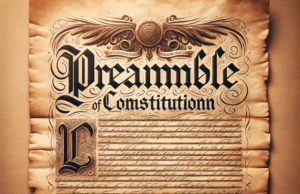Table of Contents

Article 6 of the United States Constitution: A Pillar of the American Legal System
The Supremacy of Federal Law
Article 6 of the United States Constitution establishes the supremacy of federal law over state law. This provision ensures that the federal government has the power to regulate interstate commerce, establish a currency, and carry out other functions critical to the functioning of the nation as a whole. Federal law takes precedence over state law, reflecting the commitment of the United States to the rule of law.
An Oath to Support the Constitution
The second clause of Article 6 requires all government officials, at both the state and federal levels, to take an oath of office to support the Constitution. This requirement ensures that government officials are held accountable to the people and reinforces the principle that the government’s power is derived from the consent of the governed. By taking an oath to support the Constitution, government officials acknowledge the supremacy of federal law and the foundational principles of the United States.
Article 6 in American History
Article 6 has played a critical role in the history of the United States, serving as a fundamental source of legal authority and providing the basis for many landmark court decisions. In 1819, the U.S. Supreme Court established the principle of federal supremacy in the case of McCulloch v. Maryland. More recently, Article 6 played a key role in the 1954 Brown v. Board of Education decision, which struck down segregation in public schools as unconstitutional.
Challenges and Opportunities
As the United States continues to grapple with challenges related to race, justice, and democracy, Article 6 remains a critical piece of the American legal system. Issues related to federal supremacy, states’ rights, and the role of the Constitution in determining the limits of government power continue to be debated by policymakers and legal scholars alike. However, Article 6 remains a touchstone for those seeking to build a more just, equitable, and democratic future for the United States and its people.
Conclusion
Article 6 of the United States Constitution remains a vital part of the American legal and political landscape. By establishing the supremacy of federal law and requiring government officials to take an oath to support the Constitution, Article 6 provides a foundation for a legal system that is grounded in the principles of democracy, equality, and justice. Despite ongoing debates about the relationship between federal law and state sovereignty, Article 6 serves as a reminder of the importance of the rule of law and the challenges and opportunities that lie ahead for the United States.
Article 6 of the US Constitution implemented three particular laws and conditions in the form of three clauses, the latter of which would completely change the focus of American Government for some time to come. The first, and largely the most short term of these conditions, was the clarification that all of the debts incurred and contract enacted by the nation prior to the adoption of the Constitution, while the country was still under the Articles of Confederation, would be assumed by the Government.

















